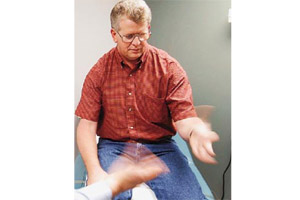Abscesses (accumulations of pus in tissues) or tumors (abnormal mass of tissue) can appear in the brain, be it on the surface of the brain or inside its tissues. Both afflictions cause an increase of pressure inside the skull and their symptoms are similar because they both cause headaches, vomiting, muscular weakness, visual defects and speech disorders.
Meningitis is an infection that causes swelling in the membranes (meninges) that cover the brain and spinal cord. The germs responsible for causing meningitis are viruses or bacteria, except in some cases, when it is caused by fungus, allergies to medication and tumors. Meningitis caused by a virus (viral meningitis) is more moderate and frequent than bacterial meningitis. It is generally developed at the end of summer and beginning of fall. More than 90% of these types of meningitis are caused by viruses belonging to the enteroovirus group. Bacterial meningitis is the most dangerous because it can cause death. The most common bacteria that cause it are neisseria meningitides and streptococcus pneumoniae. Wounds in the head caused by accidents or blows can cause grave consequences, because if the scalp and cranium are opened the brain could be damaged and cause some type of infection that complicates it. Closed wounds are just as dangerous because they can cause internal hemorrhages. Wounds in the spinal cord can cause serious motor injuries that equal paralysis.
Neuron afflictions
When a structural change, biochemical or electric, is produced in the brain and spinal cord for some reason, disorders appear that cause loss of sensation, weakness and loss of coordination. Some neuron diseases are:
– Multiple sclerosis (MS) is one of the most common disorders of the central nervous system. It entails repeated episodes of swelling of the cerebral and spinal nerve tissue. The exact cause is unknown, but it is believed to be derived from the damage of a myelin sheath (protective substance that surrounds neurons). It is a progressive disease, meaning the injury gets worse as time goes by.
– Epilepsy is an episode of convulsions or seizures that alter cerebral operation, producing changes in behavior. They are caused by an abnormal excitation in the electric signals of the brain. They can be produced by a temporary situation, like drug use, abnormal levels of sodium or glucose in the blood. On other occasions, the epilepsy seizures present themselves due to a cerebral injury (accident, cerebrovascular or cranial trauma), a hereditary anomaly or degenerative disorders (Alzheimer’s disease).
– Parkinson’s disease is a progressive damage that appears due to the gradual destruction of nerve cells from the part of the brain that uses the chemical called dopamine (it controls muscular movement). This loss of cells causes weakness and stiffness in the muscles and interferes with speech, walking and performing everyday tasks.








